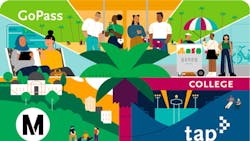Fare collection updates: L.A. Metro and Sound Transit
The Los Angeles County Metropolitan Transportation Authority (L.A. Metro) has seen success with its student free fare GoPass Pilot program while Sound Transit will switch to a flat fare system Aug. 30.
L.A. Metro
L.A. Metro has seen student boardings surpass 40 million, with more than 400,000 registered students using its free fare student GoPass for unlimited travel to school, work and leisure activities. The program initially launched in October 2021 and was made a permanent service by the L.A. Metro Board in April 2024 after a successful 2.5-year pilot.
All schools in the Los Angeles Unified School District offer GoPass to their students in partnership with L.A. Metro, along with schools in 124 additional participating school districts (including public districts, charter networks, community colleges). The GoPass free transit program is made available to students from K-12 and community college. Participating schools distribute TAP cards and activation codes so students can ride transit to school, extracurricular activities or work without the worry of paying fares.
“Transportation needs shouldn’t get in the way of any student’s education,” said L.A. Metro Supervisor and Board Chair Janice Hahn. “For many students and their families across L.A. County, the free Metro rides through our GoPass program has made all the difference.”
To expand transit access to students, GoPass participants can take unlimited free rides on L.A. Metro bus and rail, AVTA, city of Commerce Transit, Culver CityBus, Foothill Transit, Glendale Beeline, GTrans, L.A. Department of Transportation DASH, L.A. County Shuttles, Long Beach Transit, Lynwood Trolley, Montebello Bus, Norwalk Transit, Pasadena Transit, Santa Monica Big Blue Bus and Torrance Transit.
“GoPass has introduced nearly a half million students to transit so they feel confident riding it to school or wherever they need or want to go,” said L.A. Metro CEO Stephanie Wiggins. “These young people are helping [L.A.] Metro grow its student ridership and realizing all the benefits that a safe, clean and efficient transit system can deliver for them and their communities. We look forward to welcoming even more students onto our system in the coming school year.”
Sound Transit
Regular adult fare for Link light rail will be set at $3, effective Aug. 30. The new flat fare will replace Sound Transit’s distance-based fares, which range from $2.25 to $3.50. One-way fares for the T Line in Tacoma, Wash., will remain $2.
The Sound Transit Board approved the move to the new $3 flat fare for Link 1 and 2 Lines in December 2023 following public and passenger engagement about the proposed change and after considering the potential impacts on ridership, equity and the agency financial plan.
"After months of careful consideration, the board has decided on a simple, flat fare to help boost ridership in the post-pandemic era, facilitate seamless regional integration, uphold our commitment to equity and maintain financial responsibility. These changes will enable daily commuters, occasional riders and visitors to easily and confidently rely on transit to get around," said King County Executive and Sound Transit Board Chair Dow Constantine.
Changes to fare prices will also extend to Adult ORCA day passes, which will be dropped to $6 from the current $8 as part of a six-month promotional period. Under this ORCA promotion, the price for a reduced-fare pass will drop from $4 to $2. The ORCA LIFT program is unchanged and youth 18 and under will continue to ride free.
Sound Transit notes the change to flat fares will help to simplify Link travel by eliminating the need for passengers using ORCA cards to tap off when they complete their trip. Link 1 Line and 2 Line passengers will only need to tap before entering the fare-paid zone. Sounder passengers will continue to tap on before boarding and tap off when they exit.
“Moving to a flat fare will make it easier for people to take Link light rail at a time when we expect many new riders with the imminent opening of the 1 Line to the Lynnwood City Center Station, the completion of the 2 Line to downtown Seattle and the expansion of service to Federal Way,” said Sound Transit Interim CEO Goran Sparrman.
About the Author
Eman Abu-Khaled
Associate Editor
Eman Abu-Khaled is a former associate editor with Mass Transit magazine.

